Affiliate links on Android Authority may earn us a commission. Learn more.
Google in 2018: Trying to do everything
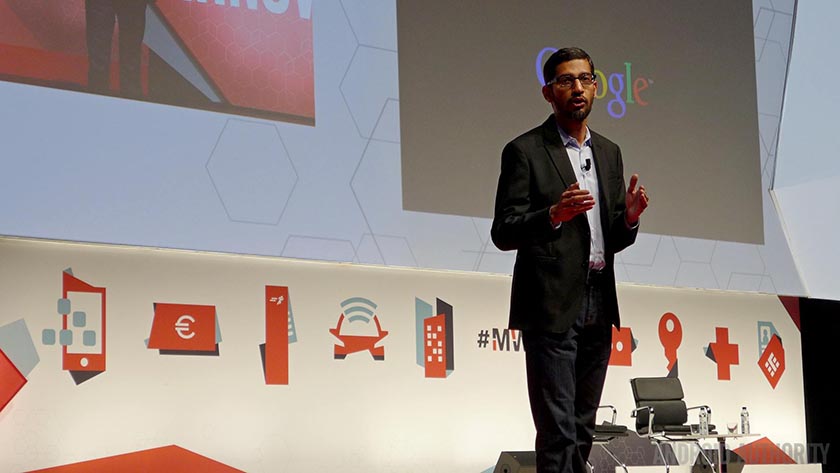
It’s been a rocky 2017 for the tech sector. Business boomed across the board, making tech giants richer and more powerful than ever, as their products became even more indispensable to our daily lives. Like any addiction though, our dependence on tech has a dark side, and in 2017, the dark side was more visible than ever.
Google had it easier than Facebook, Uber, Twitter or even Apple, but it still had to deal with issues like fake news, the proliferation of toxic and abusive content on its platforms, sexism in the workplace, and accusations of tax avoidance.
Against this background, Google improved and expanded its panoply of services, continued to focus on artificial intelligence, and made steps towards establishing itself as a first-hand consumer hardware company.
Let’s take a look at Google’s 2017 and what to expect in the year to come.
AI everywhere

Google’s initial mission statement was to organize the world’s information and make it universally accessible and useful. That remains a big part of its vision, but the company wants to be more than your librarian. Google now wants to be your personal assistant, and artificial intelligence is playing a huge role in that.
In 2018, Assistant will be the centerpiece of Google’s user-facing ecosystem
In 2017, Google continued to infuse all of its products with AI, adding new features (or improving on existent ones) that simply wouldn’t have been possible without machine learning and other AI techniques. From nicer-looking portraits, to human-like synthetic voices, to better search results, AI is now improving user experience in numerous subtle ways.
It’s Google Assistant where Google’s AI efforts really shine through. The service has developed in leaps and bounds since its launch in 2016, turning into a truly helpful assistant for hundreds of millions of users.
In 2018, Assistant will be the centerpiece of Google’s user-facing ecosystem. Expect it to evolve even faster, as Google races Amazon for a place in your living room.
Google vs Amazon

In its Google Home incarnation, Assistant is a user-friendly gateway to the smart home. It also provides a natural way to interact with technology that can be complex and arcane, making it suitable even for users who’ve never used a computer or smartphone before.
In 2017, Google Home caught up, and by some benchmarks, got ahead of Amazon’s Alexa devices. The race to own the living room shapes up to be the iOS vs Android or Mac vs PC of our times, with Assistant and Alexa establishing themselves as the top platforms for everyone else to build new products and services on.
There’s a cold war between Google and Amazon
Amazon devices outsold Google Home devices 3:1 in 2017, thanks to their low prices, diverse range, and the popularity of Amazon’s shopping platform. But while Amazon rules the market, Assistant is arguably a more capable and useful personal assistant than Alexa.
In 2018, both Google and Amazon will work hard to put their platforms into more products, from smartwatches, to cars, and entire homes. Don’t underestimate Amazon – while Google has had a longer relationship with OEMs, Amazon has already convinced many companies that Alexa is the platform to bet on. And that’s besides its own large family of Alexa products.
There’s a cold war between Google and Amazon, that occasionally flares up in open conflict, including the pullout of YouTube from Amazon’s Echo Show. While the two companies are said to be in peace talks, competition between them will only increase over the next year.
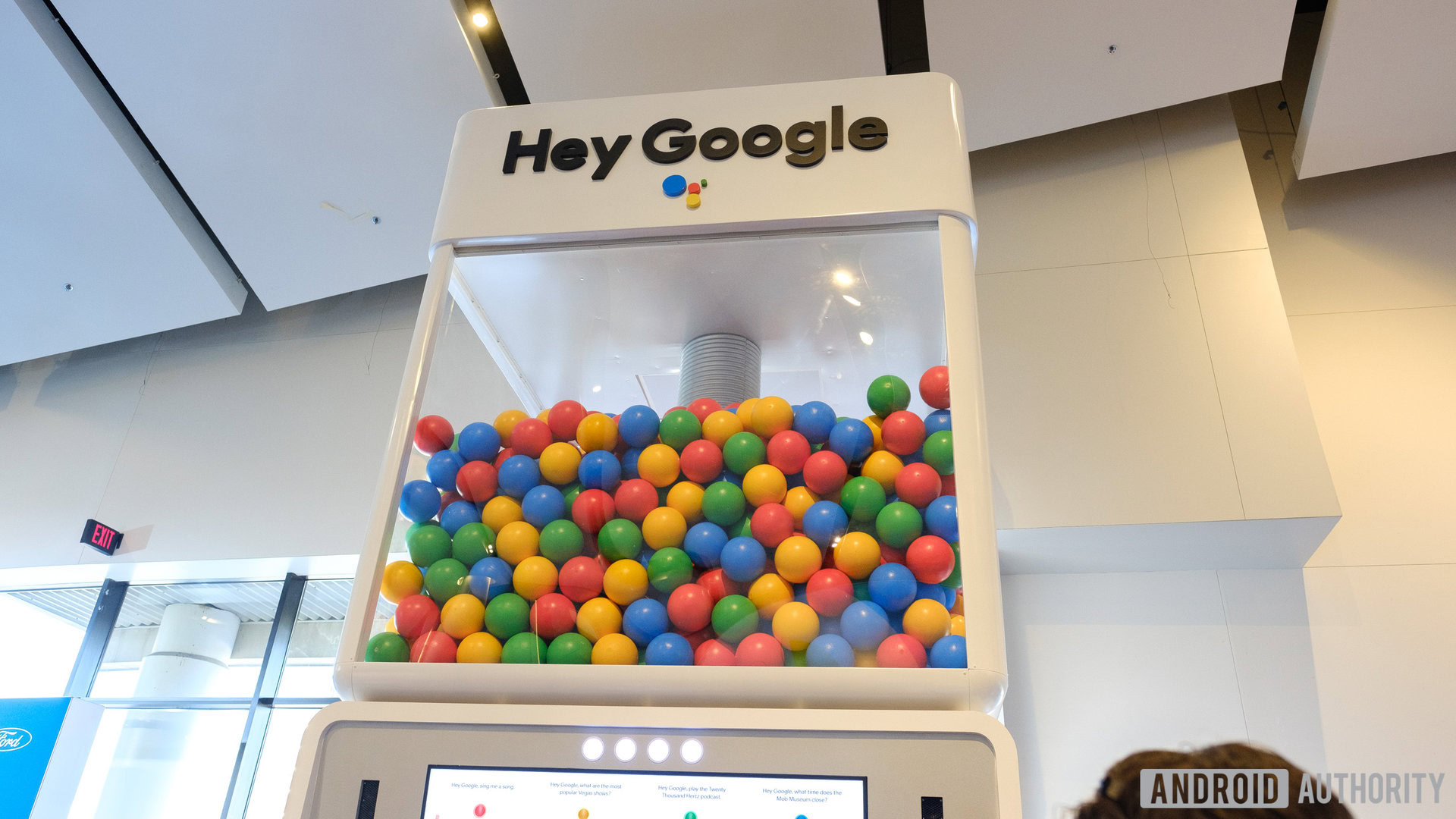
Consumer tech powerhouse?
Google has been toying with hardware for years, sometimes almost literally – case in point, Nexus Q, the $300 Chromecast precursor that Google announced in June 2012 and cancelled mere months later.
In 2017, Google was eager to show it’s finally serious about hardware. With Assistant at the core, the Google product family grew nicely into a cohesive and attractive ecosystem, albeit a tiny one. On October 4, Google introduced new Pixel phones, the Chrome OS-powered Pixelbook, new Mini and Max versions of Google Home, the Pixel Buds earbuds, and Clips, a curious little camera that uses AI to log the most interesting moments of your life.
There are many good things to say about Google’s products
There are many good things to say about Google’s products – their design is warm and fresh; their AI features are delightful; the camera on the Pixel 2’s is outstanding; and build quality is largely excellent. But there’s a lot to criticize as well, proving that Google is still an inexperienced hardware maker. The Pixel 2 XL in particular had a multitude of little issues that are hard to excuse. The Pixel Buds turned out to be… duds, and, embarrassingly, the Home Mini kept turning on by itself (and recording sound in the process), forcing Google to disable a part of its functionality.
Google’s Rich Osterloh said Google wants to deliver the full stack: AI, software, and hardware. No one is questioning Google’s expertise in AI and software. But Google still has a ways to go until it can match the hardware quality of Apple, Samsung, or even some smaller Android manufacturers.
Google is taking steady steps towards becoming better at hardware. In 2017, the company bought out a large part of HTC’s hardware operation. It also established a separate hardware team based in Shanghai, close to the global epicenter of electronics manufacturing. That’s a clear sign that Google wants to make world-class products. What’s less clear is Google’s long-term strategy. The company obviously wants to build great hardware products, but it does a remarkably poor job at selling them (for now). What’s the end game? Does Google really want to fight Apple and Samsung? Or is it essentially just posturing meant to sway Android OEMs towards its agenda?
Android One and Android Go
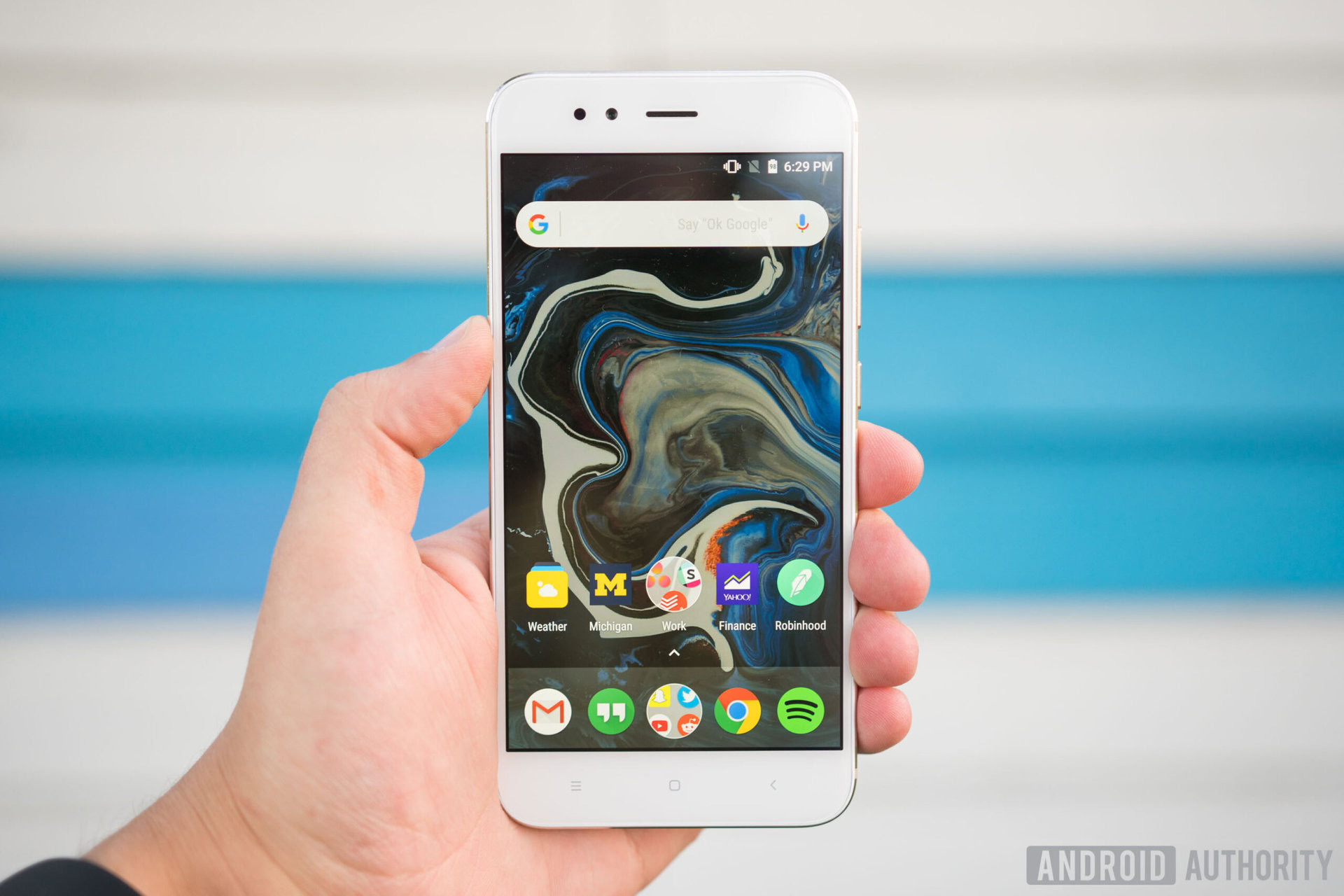
At the top of the Google hardware totem pole sits the Pixel 2 XL. At the bottom, there’s a new generation of affordable smartphones made for the hundreds of millions of users in the developing world that are coming online for the first time.
We’re looking forward to seeing more Android One devices
Android One seemed dead in the water, but in 2017, Google revived it in partnership with global OEMs like Xiaomi and Motorola. Running (almost) stock Android with a promise of fast updates, and offering capable hardware at affordable prices, phones like the Xiaomi Mi A1 and the Moto X4 are the spiritual descendants of the Nexus 5. They are excellent choices for anyone who wants a decent phone at a decent price. In 2018, we’re looking forward to seeing more Android One devices, including perhaps some from other major partners.
Another great development from 2017 was Android Go, a special version of Android designed for phones with little memory and processing power. Similar in spirit to the original form of Android One, Android Go will provide a great Google-sanctioned experience to a segment of the market that has been long ignored by most major OEMs. There’s very little money to be made in phones that sell for less than $100, leaving users to deal with outdated hardware, nonexistent customer service, and a generally poor user experience. Rumored to launch in the next weeks, the first Android Go phones will finally provide a solid alternative.
Money, money, money
In line with the industry, Google has steadily increased its revenues and profits throughout 2017. The graph below, showing the evolution of Google’s revenue in the past decade, is staggering.
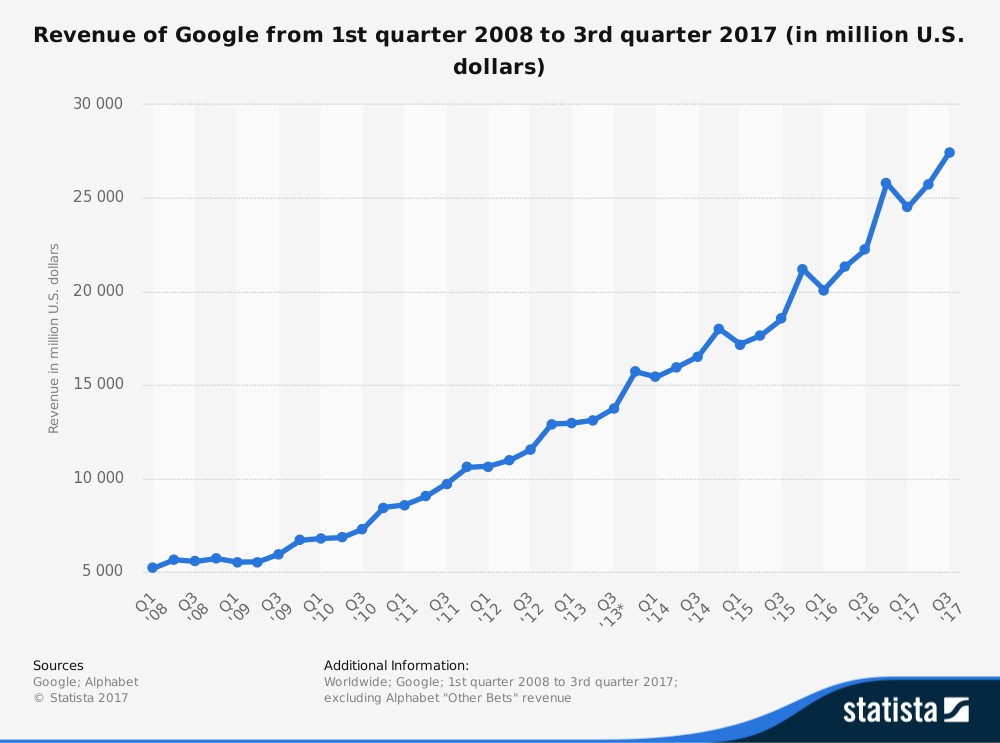
We don’t expect anything to change in 2018 in this regard, bar a catastrophic event. It’s hard to even imagine what could take down Google at this point. That’s not to say there won’t be challenges, even major ones. They just won’t be able to throw the Mountain View juggernaut off track.
Regulators could force Google to make damaging changes to its business model
One challenge could be new regulatory attacks from Europe as well as other jurisdictions. Google has already been slapped by the EU with a $2.7 billion fine for search engine results manipulation. Other investigations are looking into Google’s business practices related to Android and its lucrative AdSense business. The fines may be meaningless compared to Google’s revenues, but regulators could also force the company to make damaging changes to its business model.
Another potential issue could stem, in the long term, from the increased scrutiny over privacy. The public is bombarded with stories about hacking, data theft, spying, and unscrupulous use of personal information by companies small and large. By the nature of its business, Google is somehow vulnerable to any developments that would make users more interested in privacy-focused alternatives to Google products.
Wrapping up
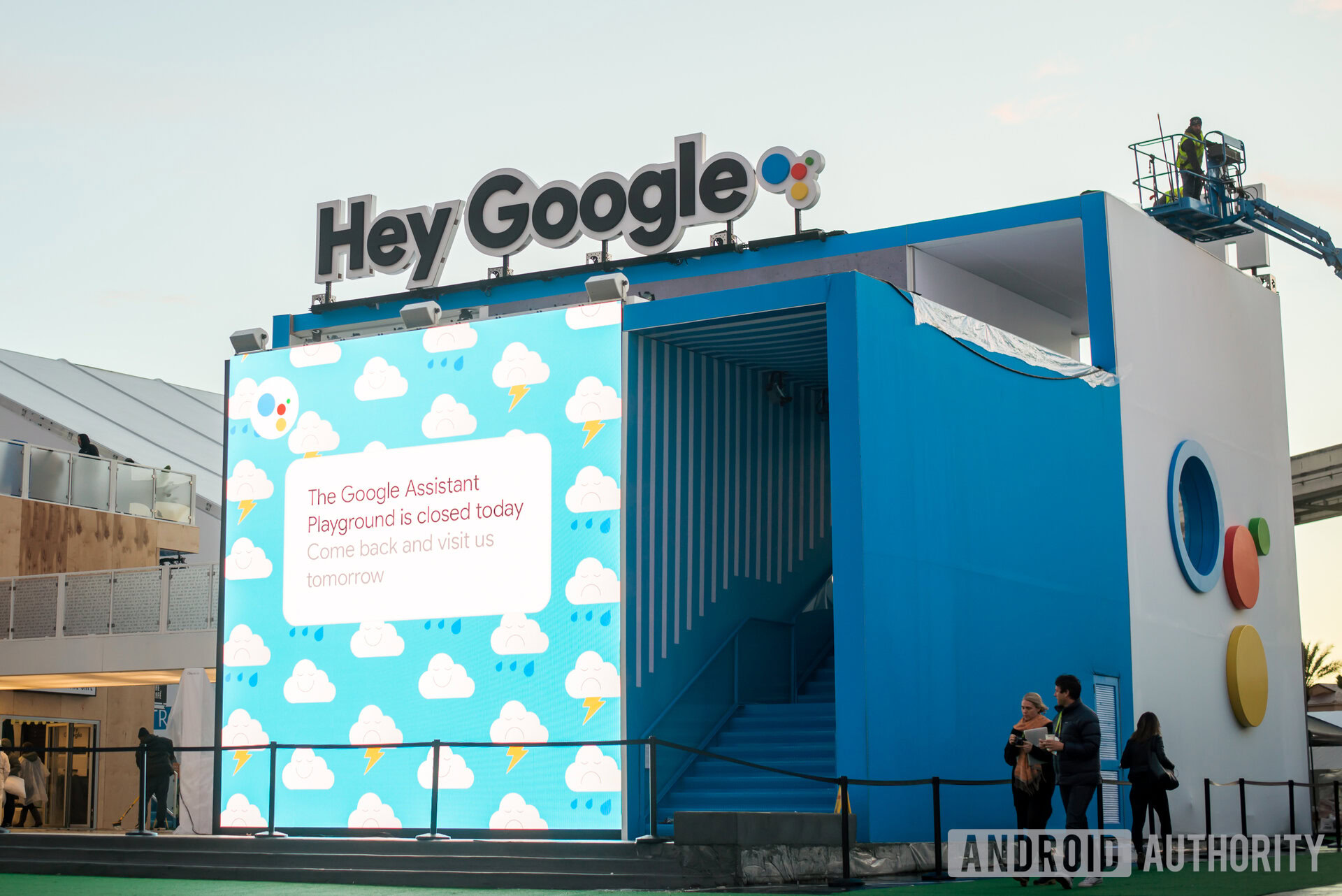
More and more, Google is the company that does – or wants to do – everything. Name a field in technology, and Google probably has established products, or at least projects or plans that are relevant to that field. This doesn’t mean that Google does everything right, and its history is littered with failed projects. Project Tango, which Google killed in 2017, is the perfect example. Google’s many messaging products are another one, despite the huge effort that Google put into them.
it's almost inevitable to alienate Samsung
In 2018, Google will roll out even more AI-based features and products, as it races to grab as much land as possible before competitors catch up. The cold war with Amazon could be the defining story of the year. Another silent conflict to watch will be the one between Google and Samsung. If Google is serious about hardware, it’s almost inevitable to alienate Samsung, as Google continues to grow its hardware lineup into a credible alternative to Samsung’s.
The big challenge for Google in 2018 – and beyond – is to stay focused while it attempts to do everything, from $100 smartphones to $100 million quantum computers. That’s insanely difficult, but Google’s never been scared of “difficult.”